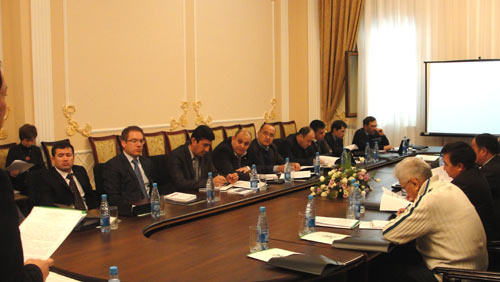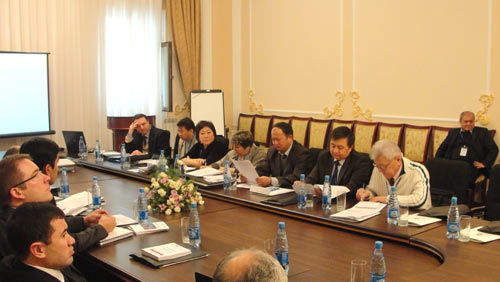FINAL REGIONAL WORKSHOP “CAPACITY BUILDING FOR INTEGRATED WATER RESOURCES PLANNING AND MANAGEMENT FOR CENTRAL ASIA”
The final regional workshop within the joint program of UNESCO-IHE and SIC ICWC “Capacity Building for Integrated Water Resources Planning and Management for Central Asia” was held on 19-20 December 2012.
The purpose of that event was to discuss the key provisions of future activities and the Educational Capacity Building Strategy in the water sectors of the countries of the region.
At the workshop, they also considered the project outcomes, prospects for the development of the training (advanced training) system for Central Asian countries water sector specialists, raising funds of international donors to impalement the given task.


The workshop was attended by regional and national trainers, representatives of higher educational establishments of Central Asian countries, for example Kazakhstan National Technical University named after K.I. Satpaev, Kyrgyzstan Agrarian University named after K.I. Skryabin, Tashkent Institute of Irrigation and Melioration, as well as representatives of international organizations such as World Bank, United Nations Development Programme, German Agency for International Cooperation, United States Agency for International Development, Swiss Agency for Development and Cooperation, International Water Management Institute, etc.
The workshop was opened by the Deputy Head of the Chief Water Management Department under the Ministry of Agriculture and Water Resources of the Republic of Uzbekistan Mr. R.A. Mamutov.
Prof. V.A. Dukhovny in his welcoming address introduced his view on the development of IWRM potential in Central Asia.
Dr. Yu.Kh. Rysbekov presented the results of the implementation of the joint program, in particular the outcomes of the national workshops conducted in each country.
Mr. N.P. Mamataliev informed the workshop participants of the Training System Development Strategy at the national level for the period of 2013-2015.
Dr. E.E. Drugaleva presented a draft curriculum for the training courses on the subject “Irrigation technologies and administration of water management organization”.
Dr. B. Janusz-Pawletta, teacher of the Kazakhstan-German University, delivered a report about the water initiative “Water Diplomacy” undertaken by Germany in Central Asia.
Dr. A.G. Galustyan gave the information about the regional workshop held in the Kazakhstan-German University on 9 November 2012 and made a presentation concerning the implementation of the IWRM concept in Central Asia, particularly the role of training in dissemination of knowledge and best practice.
The situation in the Uzbekistan water industry and future plans on the development of the training and retraining system for water specialists was elucidated in the report made by V. Akhmadjonov.
In his presentation Mr. Joop de Schutter set a task of establishing a network of capacity building in the Central Asian countries water sectors before the regional and national teams; he highlighted the key problems in the field existing at the moment in the region focusing on the ways to resolve those.
Dr. Sh.Sh. Mukhamedjanov delivered a report regarding the training related activity within the project “Water Productivity Initiative at Plot Level”.
Then Dr. A.G. Galustyan took the floor to report about the training activities towards IWRM capacity building in IWRM field within the project “IWRM-FV” (2001-2012).
Ms. E.E. Tsay presented the information on the SIC ICWC TC database, in particular about the workshops held in the Regional Training Center and their participants.
The second day of the workshop was opened by the report of Ms. G. Nurmukhamedova concerning the IWRM concept promotion in Turkmenistan.
Special attention was paid to the discussion of the Training System Development Strategy for 2013-2015 in the context of business planning; its basic provisions were developed and presented by Dr. Yu.Kh. Rysbekov.
Dr. A.G. Sorokin shared information about ASBmm modeling.
The recommendations and notes received in the course of the final workshop concerning the organization of the trainings within the ICWC system were as follows:
- The Training Center activity should follow two main directions:
- Development of new and existing training materials with the aim to ensure access to these materials for all national teams and higher educational institutions dealing with the improvement of water management and irrigated farming. This work has to be attended by summing up the international experience in various directions of capacity building in the water sector and dissemination of it. At that, it is very important that the regional trainings pertaining common problems of all Central Asian countries be conducted with equal involvement of all the countries with the view of developing a common understanding of both problems and their solutions and provide a basis for reaching a common consensus between their participants as the representatives of the countries. From this point of view this iterative training is of primary importance and, at the same time, lays the foundation for developing the potential of national training centers. This part of the Training Center activity includes analysis of the current situation in relation to the personnel training in the CA countries and development of e-learning. In this area, it is essential to establish contacts with not only water and agricultural bodies in the CA countries, but also with all universities the curricula of which include the subjects related to water resources and irrigated farming management. This area should have a source of sustainable financing by donors and contributions from ICWC founder organizations. Long-term contracts with educations institutions can be concluded.
- Another area must be organized based on requests from national bodies of ICWC, BWOs “Amudarya” and “Syrdarya”, Interstate Commission for Sustainable Development system organizations and various national educational institutions on a contractual basis to provide them with trainers or conduct specialized trainings. In this case, the cost of accommodation, travel and material security costs for of trainees are to be covered by the organizations whish the trainees work for. SIC ICWC has the experience in the organization of such trainings of specialists in using information systems in Turkmenistan, Kazakhstan, and Kyrgyzstan. SIC ICWC works with the Ministry of Agriculture and Water Resources of the Republic of Uzbekistan upon the same terms, where the latter covers the TC maintenance costs as well as all training-related costs.
- A series of new directions for the preparation of target curricula is recommended:
- Improvement of land state, operation of drainage, and control over the use of saline water;
- Organization of the operation of large facilities and providing their safety;
- Improvement of the water management scheme maintenance and operation system;
- Operational hydrometry;
- Informational technologies and computerization;
- Automation and SCADA system;
- Nation-wide reforms in the water sector.
- It is necessary to create an organogram (organization chart) of the Center activity and relationship with water management organizations as well as with the universities and other educational institutions in the form of a pyramid of training organization in the Central Asia water sector along with the identification of target groups.
- As a promising direction for TC activities, one should consider training of the personnel of water supply and sanitation services.
- Special workshops on international water law and legal training must be arranged.
- Organization of special paid trainings for post-graduate students must be thought over.
- Regular dissemination of information about supposed trainings with the invitation of external paid participants.
|